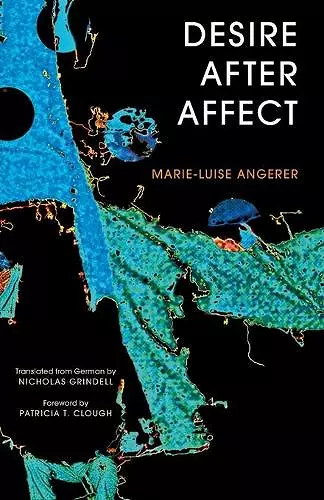Desire After Affect
Marie–luise Angerer author Nicholas Grindell translator
Format:Paperback
Publisher:Rowman & Littlefield International
Published:24th Nov '14
Currently unavailable, and unfortunately no date known when it will be back
This paperback is available in another edition too:
- Hardback£119.00(9781783481309)

Desire is a term often used in conjunction with the subject. This desire is directed towards the real, which is defined as the generic core of the linguistic order. As a result of the focus on affect, the three terms—desire, the subject, the real—have been fundamentally shaken up and called into question. Affect, in various forms, is now a matter of concern across a wide range of disciplines including neuroscience, psychology, the humanities, and social sciences. All of these fields have a declared interest in affect, in emotions and sensations, in pathos, passions, and the senses. Desire After Affect argues that this affective euphoria cannot be explained solely in terms of a repression of language, logos, and reason. It argues that the affective turn is symptomatic of a fundamental shift in modes of thinking about the human condition. It explores what this means for the human and the posthuman, animal and machine, and calls for a new theory of subjectivation, a philosophy of media affect.
Desire After Affect offers a strong analysis how affect has been placed at the centre of posthuman theory. Angerer’s take is reflective, clear and inspiring in how it shows the nuances of the concept that marks a historical shift from psychoanalysis to neurosciences. The book is of high relevance to scholars in media, contemporary arts and cultural theory. -- Jussi Parikka, Professor in Technological Culture and Aesthetics, University of Southampton
Forget the cognitive revolution, think affect. Marie-Luise Angerer is very convincing in her study of affect and desire, describing what most of us are aware of without being able to explain it (which is a perfect illustration of the book): subjectivity and eroticism are changing, art and media are showing the way. Based on a very thorough study, drawing on authors ranging from Helmholtz to Malabou, with Freud, Lacan, Deleuze and Braidotti in between, this book presents the reader with an uncanny mirror image. ‘I am what the cyborg feels’ might become the new cogito. -- Paul Verhaeghe, Head of the Department of Psychoanalysis and Clinical Consulting at Ghent University and author of What About Me?
Desire After Affect represents a major intervention into one of the leading debates in the Humanities today. Translating and extending the original German version published in 2007, this English edition arrives at a timely moment of critical reflection on the so-called ‘affective turn’, which looks increasingly like an epistemological break. If sexuality was diagnosed by Foucault as the organising discourse of human subjectivity in the nineteenth and twentieth centuries, Marie-Luise Angerer examines how and why ‘affect’ has become its replacement in the twenty-first. Rather than running towards the bright lights of the promise of affect, as so many other have done, Angerer situates its discursive legacies within an unlikely convergence of very different theoretical frameworks, cautioning us to consider some of its more troubling implications. Displaying a breath-taking range of knowledge of critical theory, philosophy and psychoanalysis, this book speaks to a significant challenge to the terms of knowledge production across the arts and the sciences. Delivered with clarity and precision, yet always expansive in its terms of reference, Angerer’s book is a welcome intervention into this contested field of enquiry. -- Jackie Stacey, Professor of Media and Cultural Studies and Director of the Centre for Interdisciplinary Research in the Arts and Languages (CIDRAL) at the University of Manchester
Each chapter of Desire After Affect analyses the dispositif of affect from a different angle. The somatic turn, the human/posthuman/transhuman debate, neurobiology, sex, the digital and the unconscious are woven together in the attempt to argue for the replacing of the sexual subject altogether in favour of affect, and the uncovering of desire ‘after’ affect as momentary time lag or temporal gap […]The temporal gap of reaction – the ‘moment of a half-second’ – is Angerer’s locus of desire ‘after’ affect, and the conceptual work done to reach this climactic point is impressive indeed. * Radical Philosophy *
ISBN: 9781783481316
Dimensions: 218mm x 144mm x 13mm
Weight: 236g
160 pages